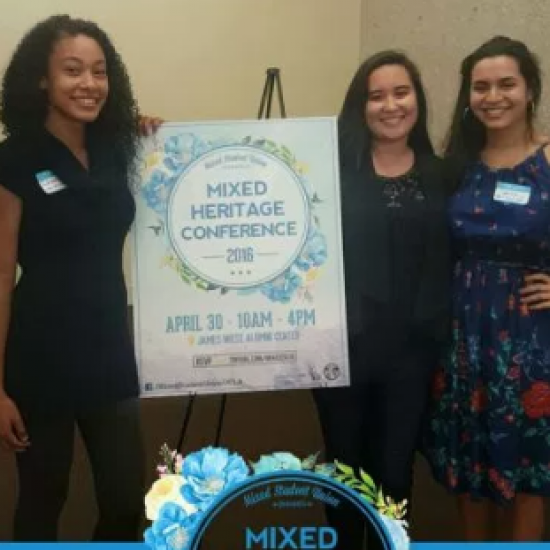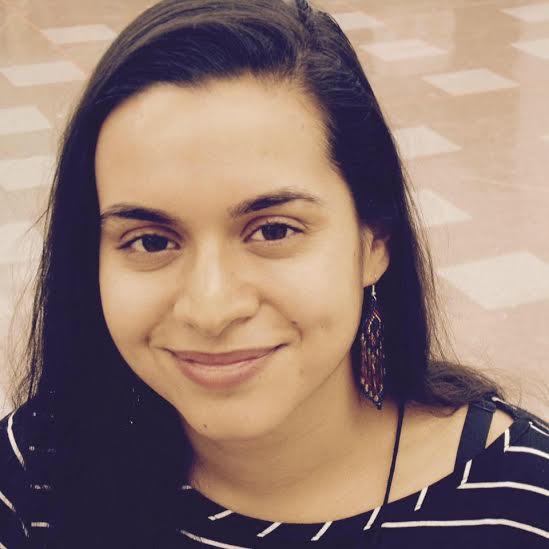Interview with Jenifer Logia, Founder of the Mixed Alumni Association at UCLA and Recipient of the 2017 UCLA Impact Award
I first met Jenifer at UCLA during their Mixed Student Union’s 5th annual Mixed Heritage Conference back in April. The recipient of the 2017 Impact Award, Jenifer is driven, yet she speaks about her experience with mixed student and alumni organizing with humility, and as having its roots in finding a community that embraced her multiple ethnic backgrounds. I interviewed Jenifer a few months later to hear more about how she came to establish the Mixed Student Alumni Association for which she was recognized, in the hopes of bringing some lessons from her experience to other student leaders in our community.
Jenifer grew up in the Bay Area with a family of Nicaraguan, Filipino and Guamanian heritage. She says that she was always made to feel that all of her cultural lineages were equally important. It wasn’t until she attended the admitted students weekend before her first year at UCLA that she found a place where she could fully express this with others. “I just happened to walk past one [table] that said Mixed Student Union. As soon as I started talking to the folks at the table, they were telling me about their different backgrounds and one person was like ‘oh I’m Mexican and Jewish’ and someone else was, you know, Canadian and Indian and all these different things and I was like oh my gosh this is me. And I’ll never forget that moment because it was literally the first time in my entire life where I even thought I could identify that way and just meeting other people who had multiple backgrounds, I just felt this immediate connection like, ‘oh wow, this is a space for me.’”
See more of Jenifer’s story in Part 1 of our video interview:
What I was most struck by in Jenifer’s story was her commitment not only to being part of and serving an insular mixed race student body, but widening her network to gain support and perspective from an intergenerational group of student and community leaders. She worked with the leaders of other race and ethnic establishments on campus, and regularly attended their meetings. Even when people looked at her strangely, she persisted in maintaining her relationships across campus to make MSU known and understood as an ally; for Jenifer, “it was just about showing up and showing up consistently.’
The UCLA Mixed Heritage Conference created the opportunity to connect with local organizers and academics. Initially inspired by UC Berkeley’s annual conference, Jenifer and her colleagues began hosting their own in an effort to bring this type of event to student organizations in Southern California at schools like UC Santa Barbara, UC Irvine and UC San Diego. By expanding the possibility of mixed student organizing, Jenifer opened up new ways of seeing how to shape community, identity, for herself and others. She says, “Knowing that I wasn’t alone and knowing that there were people out there doing work to, whether it was researching it at academic level or organizing outside of college was really big for me. It was a whole new way of understanding myself and seeing the world in a different way–having friends who I felt were like my family…and on top of being in the student group.”
See more about Jenifer’s experience with MSU in Part 2 of our video interview:
The alumni group is also premised on this notion of broad based support for mixed students. Jenifer had noticed that other more established groups obtained support through networking opportunities, scholarships and fundraising events. She made it her goal to begin the an alumni association for MSU in and effort to raise money for multiracial scholarships, provide post-graduate opportunities to MSU students, and increase representation of mixed alumnus board members. An additional benefit? Seasoned student organizers will be familiar with the sophomore slump, in which membership tapers off after the first year or two. An alumni association, Jenifer noticed, provides an external support network for student leaders to lean on during the skinny months of membership, as well as added interest for juniors and seniors who are looking for external mentorship and job training.
In addition to propping up MSU as an organization, the alumni network offers students and alumni the opportunity to understand more about their shared history as well as what mixed community looks like beyond the walls of academia and into the future. “This experience has opened my eyes to what it means to be a multiracial person later on in life or what it was back in the 90s or 80s long before I was a student. Up to the point that I started the alumni association, most of my experience talking about mixed race identity had been with college students on a college campus and so this just broadened my perspective to a much bigger level and just hearing stories from folks who attended UCLA long before there was ever a mixed student union and hearing about their experiences and how, today we’re very fortunate that students on college campuses can get together and claim a mixed identity and be proud of that, whereas before that was very much something that was taboo.” Outside of UCLA, Jenifer has noticed new issues arise around mixed race organizing. “Not everyone has that multiracial awakening in their 20s.” The dialogue is ongoing and, she says, it’s “been interesting to have that conversation with people who have professional careers and families. This has opened up a question about how we foster dialogues that’s not just about people in college, but how does this conversation look to someone who’s a little bit older?”
See more about the Mixed Student Alumni Association in Part 3 of our video interview:
These days, Jenifer has shifted some of her organizing energy to focus representing more women of color, and Latino and immigrant populations, in politics. Last year, she worked with San Mateo County on community outreach and engagement projects with the Latino community; this fall, she begins her studies for a Masters in Public Policy at Mills College. Her work with MSU has clearly left its mark. She says, “Wherever I go in life [MSU] has helped me to identify the missing pieces and that we still have a lot more work to do.”
Find out what Jenifer’s up to these days in Part 4 of our video interview.
You can see more about Jenifer Logia and the UCLA Impact Award here.
To find out more about MSU, find them on Facebook and Twitter @MixedStudentUnionUCLA
And to find out more about the alumni association, visit their website, or find them on Facebook @UCLAMixedAlumniAssociation.
Kaily Heitz is on the board of directors with Mixed Roots Stories, as the student and partner outreach coordinator. She is and alumnus of Pitzer College, where she co-created a club for mixed race students of the Claremont Colleges Consortium called MERGE, and is currently earning her PhD in Geography at UC Berkeley.


 Camila Lacques-Zapien is a multiethnic woman of color born and raised in Los Angeles committed to local community organizing, youth empowerment and arts education thanks to her passion for social justice and artistic expression. She is an avid poet, blogger, and world traveler. She studied both Chicana and Chicano Studies and International Development Studies at UCLA (’14) and co- founded the Mixed Student Union at UCLA in 2010. She currently works in education serving high school aged youth in Los Angeles and is preparing for her move to Italy for a Fulbright English Teaching Grant for the 2016-2017 cycle. You can follow her writing and reflections at:
Camila Lacques-Zapien is a multiethnic woman of color born and raised in Los Angeles committed to local community organizing, youth empowerment and arts education thanks to her passion for social justice and artistic expression. She is an avid poet, blogger, and world traveler. She studied both Chicana and Chicano Studies and International Development Studies at UCLA (’14) and co- founded the Mixed Student Union at UCLA in 2010. She currently works in education serving high school aged youth in Los Angeles and is preparing for her move to Italy for a Fulbright English Teaching Grant for the 2016-2017 cycle. You can follow her writing and reflections at: